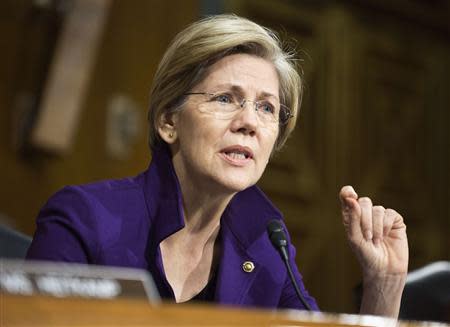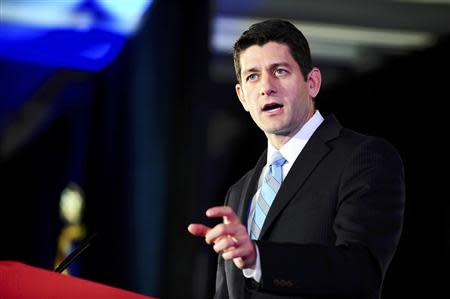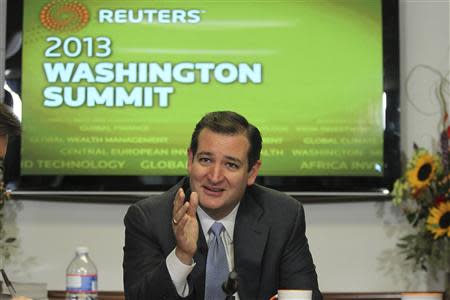Potential 2016 U.S. presidential contenders shadow 2014 elections
By Gabriel Debenedetti WASHINGTON (Reuters) - The elections that will decide who controls the U.S. Congress and most state governorships are 10 months away, but they already are becoming an early test of the political muscle of several potential contenders for the White House in 2016. No one has officially announced that they are seeking election in 2016 to be Democratic President Barack Obama's successor. But the race for the White House effectively will begin right after the 2014 election ballots are counted on November 4, so this year's elections could help build momentum - and a team of allies - for anyone considering a run for president. With that scenario as a backdrop, potential contenders for the Republican presidential nomination such as New Jersey Governor Chris Christie, Florida Senator Marco Rubio, Wisconsin Congressman Paul Ryan and Texas Senator Ted Cruz have begun getting involved in 2014 congressional and governor's races. Democrats continue to wait for former secretary of state Hillary Clinton, the overwhelming favorite among the party's potential presidential contenders, to announce whether she will enter the 2016 race. But Ready for Hillary, an independent group that supports Clinton, is signaling that it will be a prominent player in 2014 campaigns. The group raised more than $4 million in 2013 and backed the campaigns of Virginia Governor-elect Terry McAuliffe and New York City's new mayor, Bill de Blasio, both allies of Clinton and her husband, former president Bill Clinton. For 2014, Ready for Hillary is laying the groundwork for a national political operation, hiring veterans of Obama's 2012 campaign and lining up Democratic donors. The group says it has not discussed specific plans with Hillary Clinton, but is ready to use its email list and Facebook page - which has 1.5 million supporters - to back candidates she favors by promoting campaign events. "We'll have to see what Hillary does - and how early, for whom, in which states and so forth. That will be up to other decision-makers besides us," said Seth Bringman, a spokesman for the Clinton group. CHRISTIE CANDIDACY Among the Republicans, Christie is likely to be the most consistent presence on the campaign trail in coming months, provided a brewing political scandal in New Jersey does not derail any presidential aspirations he has. Christie, who has spoken openly about considering a run for the White House, was elected head of the Republican Governors Association (RGA) in November and plans to use that position to campaign for Republican incumbents across the nation. Thirty-six states will elect governors in the coming months; 22 of those states currently are led by Republicans. Those most likely to get fundraising and campaign help from Christie, strategists say, include Republican Terry Branstad, who is up for re-election as Iowa's governor. The state is home to a much-watched early contest in the 2016 presidential nomination process. Christie's post with the RGA is no guarantee of nationwide popularity, as his predecessor, Louisiana Gov. Bobby Jindal, learned last year when his polling numbers fell amid budget battles in his home state. But the RGA job will give Christie a pretext for promoting himself as a Republican who twice has been elected governor of a mostly Democratic state. It also will give Christie a chance to counter criticism he faces in light of revelations that his aides ordered lanes on the George Washington Bridge to be closed over four days last September, a move that left thousands of people stuck in traffic at a span that links New Jersey with New York City. On Thursday, Christie apologized and said he had not known about his office's role in the lane closures, which apparently were designed to create traffic in a New Jersey town whose mayor had declined to endorse Christie in last year's race for governor. Christie fired a top aide involved in the closures. The scandal has inspired state and federal investigations and has given Christie's critics a chance to cast his brash tactics as those of a political bully. 'WE'VE BEEN AGGRESSIVE' Other potential contenders for the Republican nomination in 2016 are mobilizing political machinery that will give them a presence in the 2014 campaign. So far, the most active group associated with a potential 2016 candidate is Rubio's political action committee (PAC) known as Reclaim America, according to political strategists. As part of Republicans' efforts to wrest control of the U.S. Senate from Democrats, Rubio's group has taken a targeted approach - spending nearly $200,000 on advertisements for Arkansas Republican Congressman Tom Cotton, who is in a contentious battle to unseat Democratic Senator Mark Pryor. Republicans need to gain six seats in the 100-seat Senate to take control of the chamber. They are focusing on a half-dozen Democratic incumbents in politically divided states, and have vowed to make dissatisfaction with Obama's healthcare overhaul the major theme of the 2014 campaign. Republicans believe that Pryor - a supporter of the program known as Obamacare who is in his third six-year term - could be particularly vulnerable against Cotton, an Iraq and Afghanistan war veteran who is a rising star in the Republican Party. "We've been pretty aggressive this year, and we plan to be aggressive moving forward," said Terry Sullivan, who runs Reclaim America. Sullivan said the group donated "around $400,000" to Republican senators and Senate candidates last year and is continuing its efforts. He challenged the notion that the PAC's work is being done with a 2016 Rubio campaign in mind, and said its focus is helping Republicans win control of the Senate. Other potential contenders for the White House have tapped their "leadership PACs" - groups that federal officials can use to support their colleagues - to help fund friends' campaigns. Senator Elizabeth Warren, a Massachusetts Democrat seen as a possible presidential candidate if Clinton does not run, has used her PAC, called For A Level Playing Field, to donate to other Democrats' House and Senate campaigns. (Editing by David Lindsey and Stephen Powell)




